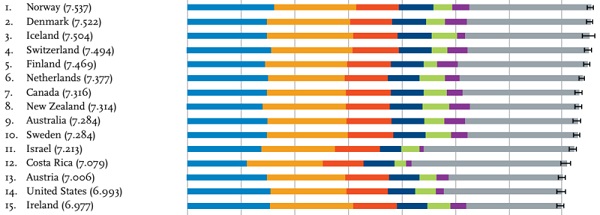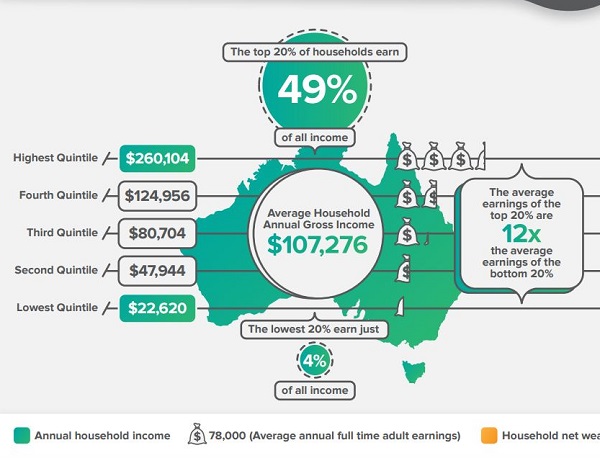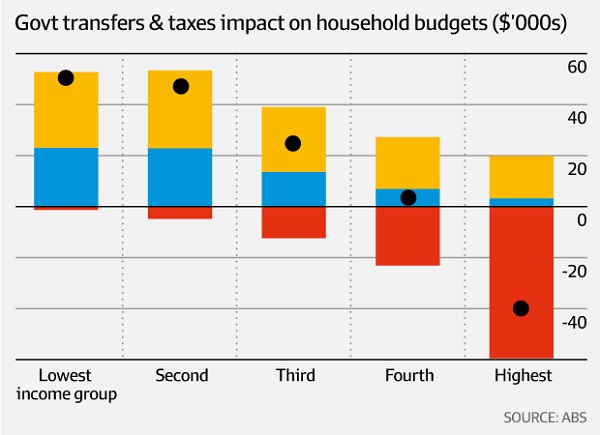
The main goal is always to beat New Zealand, but this time they beat us, according to the World Happiness Report 2017, which tells us that increasingly, happiness is considered to be the proper measure of social progress and the goal of public policy. They say:
- In June 2016 the OECD committed itself “to redefine the growth narrative to put people’s well-being at the center of governments’ efforts”.
The results are yet another resounding endorsement of the ‘Nordic model’. The top four countries, Norway, Denmark, Iceland and Switzerland are statistically a dead heat, while Finland is fifth, and Sweden ninth, tied with Australia to three decimal places, after The Netherlands, Canada and New Zealand.
Here from Bloomberg are the top 15:

The full list is from p21 in the Report.
Much attention has been given to the slide of the USA, from the third happiest country in 2005 to 14th. The current rankings are an average of 2014-16 and in 2016 the US was actually 19th, with the main reasons “declining social support and increased corruption”. Jeffrey Sachs explains in The Guardian. He:
- identifies several reasons behind declining American happiness: the rise of big money in American politics as a result of supreme court decisions, which allow billionaires and corporations to make untraceable campaign donations.
Closely related is soaring income inequality and the “severe deterioration” of US education that has left more young Americans facing a precarious and indebted future. Sachs also says the “open-ended global war on terror” following the 9/11 attacks has helped to stoke a climate of fear.
He says:
- the Republican Party’s beloved nostrum of endless tax cuts and voodoo economics – will only exacerbate Americans’ social inequalities and feed the distrust that is already tearing society apart”.
It’s not mainly about money. So then what is it about?
Happiness is judged on six categories where people have to assign a value out of 10. The categories are GDP per capita, Social support, Healthy life expectancy at birth, Freedom to make life choices, and Perceptions of corruption. The score for the last three years is averaged.
There is a seventh, from p21 in the Report:
- The seventh and final segment is the sum of two components. The first component is a fixed number representing our calculation of the 2014-2016 ladder score for Dystopia (=1.85). The second component is the average 2014-2016 residual for each country. The sum of these two components comprises the right-hand sub-bar for each country;…
It goes on, but there it lost me, which is a pity, because it is the grey bar in the graphic above, and quite important. Check it out on p21 of the Report, if you so desire.
So in the US, if increased earning power alone is to restore 2006 levels of happiness, average per-capita GDP would have to increase to about $133,000 from the present $53,000.
The report summary says that the top happiness countries have “high levels of mutual trust, shared purpose, generosity and good governance.” They are also small. Shirley Jackson of Melbourne University has the best analysis I’ve seen so far on us compared to the Nordic countries.
- The Nordic countries value equality and have invested (both politically and economically) in building more equal societies. They also retain the highest levels of union membership by a significant margin, and have some of the strongest collective bargaining systems in the world. The Nordic countries lead the world in trust in government, gender equity and freedom from corruption.
They also outperform us not only in happiness and income equality, but in trust, corruption, and economic competitiveness, and things like efficiency and innovation. They have high levels of taxation and:
- provide the most comprehensive welfare system in the world, complimented by free education and universal healthcare. From birth to death, Nordic citizens have access to quality, government-funded services irrespective of income.
This generates more positive attitudes and trust in those services. Their real strength is in their values and their capacity to act cooperatively. Jackson says they are flexible in how they go about things, and vary from one country to the other in their methodologies. Sweden, he says, has gone furthest down the path towards ‘liberalism’ and has seen the greatest drop in ranking.
Jackson says the ACTU sent a mission to Western Europe in 1986, producing the 200 page report Australia Reconstructed in 1987. The mission visited:
countries which had overcome balance of payments constraints in ways which produced low unemployment, low inflation and economic growth that was more equitably distributed. The mission’s report examined, and made recommendations about, macroeconomic policies, wages, prices and incomes, trade and industrial policy, the labour market, industrial democracy and strategic unionism.
I’m sure there is a copy in the National Library.
Of other largish OECD countries, Germany was in 17th place, the UK in 19th, France in 32nd and Japan in 51st.
Ukraine was the unhappiest European country at 133.
The top Asian country was Singapore at 26th. China was 79th and India 122nd. They say that Singaporeans make a national sport out of complaining, and there may be cultural factors as to why Asian countries don’t do well on the survey. In other words it might have a Western bias.
However, China is interesting in that it got more miserable as the economy grew, with a turnaround about 2005. Nevertheless happiness is below where it was 25 years ago.
Italy is 48th and Russia 49th.
The bottom five are Rwanda, Syria, Tanzania and Burundi, with Central African Republic 155th and last.
The biggest change for the worse since 2005-2007 has been Venezuela, followed by the Central African Republic, Greece, Botswana and Ukraine.
The survey says that there are greater differences within countries than between. Mental health is a biggie, but income does matter. An Australian expert I heard said income matters up the $120K (I assume household income). Beyond that more income makes us no happier.
Here’s the cropped McCrindle infographic (from 2016) I linked to on Saturday salon 25/3:

And here’s the image from Laura Tingle’s article giving quintiles of household tax, cash transfers and services:

How it would look in the Nordic model I’m not sure, but more red and yellow, I think, and probably more blue in the lower quintiles.
The Tibetan Buddhists tell us we are happier with we feel and act upon loving kindness, equanimity and compassion. To wish for happiness directly is to be stuck in the muck of samsara. The way the rich could become happier is to give the loot away to those who need it. However, the compassion and the giving would need to be voluntary and genuine.
Tibetan Buddhists are very serious about compassion, which is based on a particular ontology, where everything we do, every thought, matters for everyone and for all time. We should probably remember that in our culture the assumption that happiness could be within our reach is a relatively new phenomenon.
Tiffany Watt Smith (that link is about her work) thinks measuring it and figuring out how to have more of it is problematic, to say the least. I think the last word is a long way from being spoken.
Meanwhile Bhutan, famous for inventing the Gross National Happiness metric, and having an official happiness policy, came in at 97th this year, falling 13 spots from 2016.

I remember some time ago that the two happiest electorates in Qld were Ryan (Affluent, educated leafy suburbs.) and Hervey Bay (At that time well down on the affluence scale.)
The thing that linked both was that these electorates were each fairly homogeneous in terms of visible standard of living.
Thanks a lot for selecting this topic, Brian.
Living in The Other Australia, as I do, my immediate concern was that the data may have had biases skewed toward metropolitan areas.
It is hardly surprising that China has slipped, that its people became more miserable as the economy grew. The erosion of commonality would account, in part, for that; look at what happened in the former East Germany where nostalgia for the old regime surprised many observers.
A penny for your thoughts ….
Still, this topic is a welcome change from the dreary Tweedledum vs. Tweedledee tantrums that pass for politics in Australia.
It sort of looks like they constructed the formula to tell us what they think should make us happy.
Jumpy, I think they were giving it their best shot. But the earlier post I did makes clear that ‘happiness’ is a culturally-derived concept. The whole business of language works on people assigning the same meaning to words, whereas we know that we don’t exactly.
Oddly, Tahitians don’t have a word for ‘sadness’, although they do have low, draggy feelings. They don’t bundle them up and label them in the same way. That’s according to a recent New Scientist article, quoting Lisa Feldman Barrett from Northeastern University in Boston.
I tend to be happy with where I am and what I am doing. When I move or start something else the same still applies so I think I have had a good life. Living with someone who has a similar positive outlook helps.
I would find it difficult to define happy even though I do know when I am and aren’t happy.
Got to be skeptical of happiness indexes when people like those miserable Swedes do well on happiness scales.
Graham, my understanding is that economic growth in China brought a lit of social dislocation, with people having to leave the farms and move away for work in the factories, where there were a lot of sweat-shop conditions and poor living conditions.
Also the one-child policy was humungous in causing unhappiness.
Then there was a lot of rural consolidation. I remember being shocked at one stage by a farm size figure that was smaller than our house block, which is only 24 perches.
Being a Democratic Constitutional Monarchy with a Christian type culture looks like a jump start.
Dunno Jumpy. Those poms are famous for whingeing despite living in a democratic monarchy. Or does the happiness index miss this basic fact in favour of indirect measures?
Don’t know how thats a basic fact but I recon I could devise a happiness index formula that puts Jamaica on top.
Im sure the UN aren’t silly enough to make findings contrary to their agenda.
Jumpy: GDP per capita is a fact. Whether we actually feel happy as a result of high GDP per capita is a lot more fuzzy.
Jumpy, you are being cynical. This Wikipedia article is useful.
The report is published by the United Nations Sustainable Development Solutions Network. It’s another effort to go beyond GDP in policy development on development.
The Wikipedia ranking table gives the country scores for each category. Turns out that Norway’s strong point is actually GDP.
If you want to find Jamaica look at no. 76.